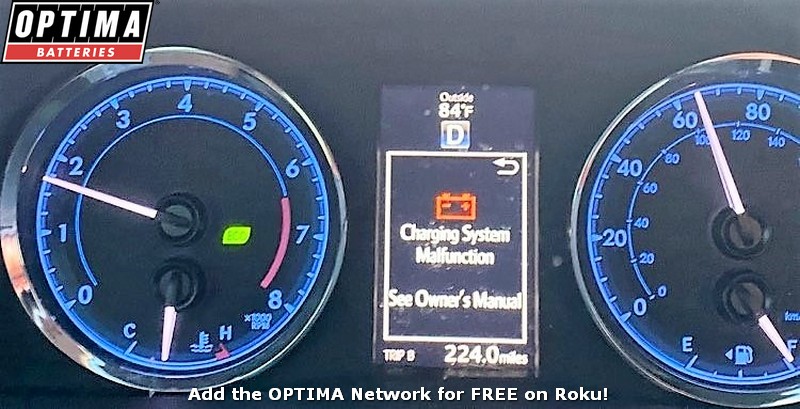Corolla Charging System Warning Light

- Sponsor
- OPTIMA Batteries
- Location
- Orlando, FL


Gary is a semi-retired Toyota Corolla owner, living in the Orlando metro area. Gary is only semi-retired, because he operates a car service, which basically amounts to Gary and his trusty Toyota Corolla. When our own OPTIMA Jim needs to be driven to the airport, Gary is the most-reliable option, especially for early-morning flights. As a frequent client, Jim & Gary have conversations on a variety of subjects, including Gary's Corolla.
A few weeks ago, Gary mentioned that he had the battery replaced for the second time in less than 100,000 miles. That may seem unusual to some, but the hot climate in Central Florida significantly decreases the lifespan of all car batteries. As Gary was bringing Jim home from the airport, he noticed the charging system malfunction warning flashing on his dashboard. Jim didn't want to jump to conclusions, but given the fact that Gary had recently replaced the battery, Jim immediately suspected Gary's alternator was failing.
The reason Jim thought this is because Gary essentially uses his Corolla as a taxi cab, which in the battery and alternator world, is generally considered a very harsh environment- lots of time spent idling with the engine running and powering accessories, like the radio, lights and heater or air conditioning. In Gary's case, the environment is even more demanding, because Central Florida is so warm. Heat not only shortens battery lifespan, but causes similar damage to alternators.
With Gary's battery being replaced so recently, Jim immediately asked if the person who changed the battery had also tested the alternator. Gary said they did not. Unfortunately, this is a very common occurrence- techs load up the parts cannon and start firing, without doing any type of basic diagnostic work. If the alternator had been tested when the battery was replaced, they might've noticed then that it was failing. Since they didn't, Gary spent several weeks driving his Corolla with a new battery and a bad alternator, likely putting significant and unnecessary stress on the battery and prematurely shortening its lifespan.
When they arrived at Jim's house, Jim grabbed his voltmeter and measured voltage of the battery at the terminals with the engine running- 12.0 volts. Is that a good number for 12-volt system? No! Most batteries are not fully-charged until about 12.6 volts, so if an alternator is only putting out 12.0 volts, it is not properly-maintaining battery voltage. We recommend typical alternator output to be in the range of about 13.7-14.7 volts, as measured at the battery terminals, with the engine running. As the Corolla sat and idled, it was also obvious that the idle was periodically picking up and going faster, before settling down- another symptom Gary had been noticing for several weeks.
Jim recommended Gary keep his engine running, drive home with the air conditioning and radio turned off and back his car into the driveway, just in case the battery needed a jump to start in the morning. Fortunately, the battery still had enough energy to start the car in the morning and Gary drove it straight to the dealership, where the proper diagnosis of a bad alternator was confirmed.
Jim advised Gary to make sure his battery was fully-charged to at least 12.6 volts with a battery charger and to hold onto his receipt for his battery, as there's no telling how much damage was done to it and it might need to be replaced under warranty. Should that be the case, having the receipt handy will expedite that process.
Since Gary's Corolla was never designed or intended to be used in taxi service, more frequent replacement of the battery and alternator is likely to occur throughout his use of the vehicle. He can mitigate that to some degree, by not idling as often, especially in hot ambient air, but that is part of the deal for any vehicles used in severe duty applications, including taxicabs and police cars. Gary may also want to stay on top of his cooling system maintenance, as that system is likely getting worked pretty hard as well.
On the battery voltage maintenance side of things, OPTIMA can help with our full line of battery chargers and maintainers. We recommend every vehicle battery be charged with a battery charger at least once a month, even daily-driven vehicles, to ensure proper battery voltage is being maintained.
